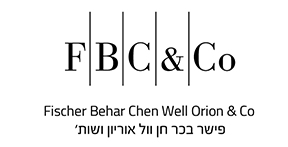Israel has encouraged and attracted inbound foreign investment for many years. Japanese investors in particular have shown increased interest and investment activity in Israeli companies, several of which have formed an Israeli corporate venture capital (CVC) fund.

Partner and Head of Tax Practice
Email: ashavit@fbclawyers.com
One of the primary tools for encouraging inbound investment is the special tax regime for private investment funds. Over the years, the Israeli Tax Authority has issued substantial guidance and numerous private rulings under the Israeli Income Tax Ordinance, providing significant tax benefits to foreign investors and private investment funds.
These arrangements are predominantly based on Income Tax Circulars 9/2018 and 10/2018, which govern the taxation of venture capital (VC) funds and private equity (PE) funds, respectively.
The special tax regime applicable to private investment funds is currently under review by the Tax Authority and the Israeli Ministry of Finance, and, as such, tax benefits that are available under the existing regime may be adjusted and further criteria for entitlement added.
However, such changes are not expected to affect existing arrangements for non-Israeli limited partners.
Key terms
Qualifying investment. Investment in shares of an Israeli resident company, or in the shares of an Israel affiliated company whose principal activity is a qualifying activity, including VC investments. Investments in securities traded on the stock exchange will not be considered qualifying investments unless the fund’s holding period of a publicly traded portfolio company is at least one year from the time of the fund’s first investment.
Qualifying activity is an establishment or expansion of enterprises engaged in activities in Israel in the areas of industry, agriculture, tourism, transportation, construction (excluding real estate), water, energy, technology, communications, computing, security, medicine, biotechnology, nanotechnology, or research and development in these areas.
Israel affiliated company is a foreign company whose principal assets and/or activities directly or indirectly are in Israel.
Shares include stock options or warrants, convertible notes and/or convertible bridge loans that are not secured by assets other than the technology or the assets that the target company owns.
Venture capital investments are qualifying investments in the high-tech sector, where at least 75% of the total investment is in consideration for the issuance of shares.

Partner
Email: rlehmann@fbclawyers.com
Beneficial tax treatment
The principal conditions for beneficial tax treatment for non-Israeli investors regarding their investments in PE and VC funds are the following:
. The fund must have at least 10 unrelated investors, directly or indirectly;
. Investors may not hold more than 20% of the capital of the fund, with the anchor investor able to hold up to 35%;
. At least 30% of the investors in the fund must be non-Israeli investors;
. Total investment commitments must be at least US$10 million, of which at least US$5 million must come from non-Israeli investors;
. The fund may not invest more than 25% of its total commitments (net of management fees) in any single company;
. The fund may not invest more than 20% of its total funds raised, after the deduction of management fees, in companies with securities that are publicly traded;
. The fund may not hold short-term cash deposits or publicly traded securities, unless they originate from monies that investors transferred in accordance with their investment commitments in the fund, or if they originate from the realisation of profits prior to their distribution or reinvestment;
. The fund must invest in qualifying investments in Israel in accordance with the lesser of:
(1) at least US$10 million in qualifying investments of which at least US$6 million must be invested, directly or indirectly, in companies whose intellectual property is owned by an Israeli resident and/or in their non-Israeli parent companies; or
(2) at least 50% of the fund’s total commitments in qualifying investments, of which at least 30% of total commitments must be invested, directly or indirectly, in Israeli resident companies with intellectual property owned by them and/or in their non-Israeli parent companies;
. The fund must be managed by the general partner, or by a person on its behalf. The limited partners may not take any role in identifying target companies, or managing the portfolio companies, or in the day-to-day management of the fund, and shall not have any voting rights in the investment committee of the fund;
. The fund may be required to provide certain financial information to the Tax Authority; and
. Investors in the fund may be required to provide certain information to the fund, or the Tax Authority, in order to establish their right to enjoy the benefits of a Tax Authority ruling issued with respect to the fund.
However, it is worth noting that limited partners holding more than 4% of the interests in the fund may not control the entities managing the fund and may not hold more than 10% of the general partner, if they wish to enjoy the tax benefits.

Partner
Email: sitton@fbclawyers.com
Tax arrangements
If all of these conditions are met, the following will apply to the non-Israeli investors in the fund, and in the general partner.
Tax arrangement for non-Israeli limited partners. Income derived from non-Israeli investments (i.e., non-Israeli companies or non-Israeli affiliated companies) will be exempt from tax in Israel.
Income derived from VC investments (i.e., capital gains, dividends and interest) will be exempt from tax in Israel.
Income derived from qualified investments that are not VC investments will be taxed as follows:
. Income from the realisation of qualified investments will be exempt;
. Dividend income attributed to individual investors (including if held through a transparent entity for tax purposes in the country of residency of the individual) will be subject to tax at the rate of 15%;
. Dividend income attributed to corporate investors will be subject to tax at the corporate income tax rate (currently 23%);
. Foreign investors from a treaty jurisdiction, like Japan, may be eligible for tax rates set out under the applicable treaty (15%, for a percentage holding lower than 25%), subject to confirmation of tax residency and beneficial ownership by the Tax Authority;
. Interest income will be subject to tax at the regular applicable tax rates set out in the Income Tax Ordinance (individuals at 15% to 50%, depending on the nature of the interest, and corporates at 23%);
. Non-Israeli investors from a treaty jurisdiction, like Japan, may be eligible for tax rates set out under the applicable treaty (10%), subject to confirmation of tax residency and beneficial ownership by the Tax Authority;
. Any other income not covered above, including income from management fees received from portfolio companies, will be subject to regular tax rates set out in the Income Tax Ordinance (up to 50% for individuals, and 23% for corporates); and
. Foreign investors in the fund will not be considered as tax residents of Israel, and will not have filing obligations in Israel, as a result of their investments in the fund.
Tax arrangement for non-Israeli fund managers. Once the fund qualifies for tax benefits, the general partner and the fund managers may also be entitled to certain tax benefits. Carried interest income attributable to Israeli Investments will be subject to tax at the rate of 15% in the hands of non-Israeli fund managers.
Carried interest income attributable to investments in foreign entities will not be subject to tax in Israel. However, non-Israeli general partners and fund managers from a treaty jurisdiction may be eligible for the tax rates set out under the applicable treaty, subject to confirmation of tax residency and beneficial ownership by the Tax Authority.
Income derived from management fees will generally be subject to the regular tax rates set out in the Income Tax Ordinance (currently up to 50% for individuals, and 23% for corporates).
If conditions are not met
Over the years, the Tax Authority has issued alternative tax arrangements for funds that do not meet the above-mentioned criteria. For these situations, the following describes the available beneficial tax treatment.
Funds that have fewer than 10 investors. Income from realisations of qualifying investments will be subject to 15% income tax, while income from interest and dividend payments that are derived from qualifying investments will be subject to tax at the lesser of 15% and the tax rates under an applicable tax treaty. Other income that is not derived or accrued from qualified investments will be subject to the tax rates established in the Income Tax Ordinance.
Income derived from non-Israeli companies will be exempt. Funds with less than US$10 million in commitments. A beneficial tax arrangement will be available to funds that are focused on making VC investments, and the income from realisations of VC investments will be exempt.
Income from interest and dividend payments will be subject to tax at the lesser of:
(i) the tax rates established in the Income Tax Ordinance; and
(ii) the tax rates under an applicable tax treaty.
Non-Israeli fund investing in Israel without representation in the country. Generally, such a fund will enjoy the same tax benefits as described under the “Tax arrangement for non-Israeli limited partners”. Non-Israeli managers of the fund will be entitled to exemption from Israeli tax on their carried interest (as opposed to 15% tax on carry sourced from investments in Israel, for a fund with Israeli representation), and on their management fees.

Anat Shavit
Partner and Head of Tax Practice
Email: ashavit@fbclawyers.com
Ron Lehmann
Partner
Email: rlehmann@fbclawyers.com
Ron Sitton
Partner
Email: sitton@fbclawyers.com
Fischer Behar Chen Well Orion & Co
146 Menachem Begin Rd.
Tel Aviv 6492103, Israel
Tel: +972 3694 4111





























